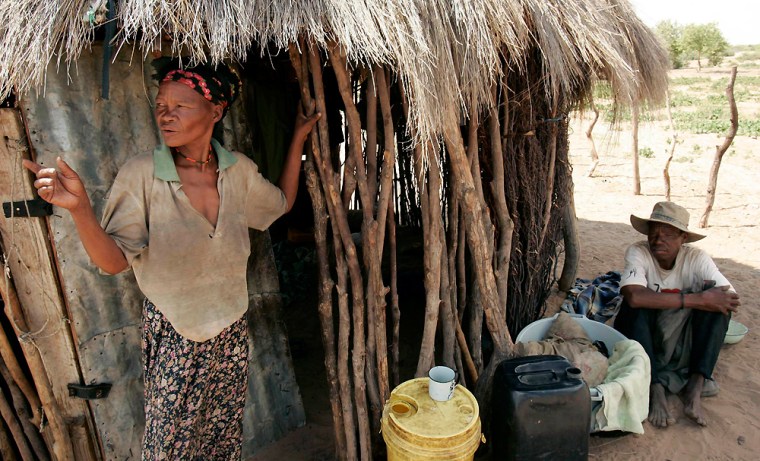It’s early afternoon in this Bushmen settlement in the Kalahari desert and everyone is drunk.
Removed from their ancestral land by the government, Botswana’s Bushmen, also known as San, are unable to hunt or gather wild berries and have little else to do but drink potent fermented barley beer.
“I suffer here. I want to go home, where I know where to find plants to eat and eland to hunt,” said 61-year-old Letshwao Nagayame at this bleak resettlement camp about 124 miles north of Botswana’s capital, the smell of alcohol wafting as he speaks.
“Here all we do is drink — this beer, it will finish us.”
Botswana’s High Court will on Wednesday decide if Nagayame and some 1,000 other Bushmen — one of the world’s last surviving hunter-gatherers — can return to the land where their ancestors speared wild game and foraged for wild plants for 20,000 years.
Major land dispute
In one of Africa’s most high-profile land disputes, the Bushmen say the government illegally forced them off protected hunting grounds in the Central Kalahari Game Reserve (CKGR) in the late 1990s and early 2000s to make way for diamond mining.
But Botswana says the San, some of whom now drive trucks and wear modern jeans and tracksuits, abandoned their traditional ways long ago and that the reserve is a poverty trap that stops them working for a better life and denies them access to health and education.
The government says western activists, who have won the backing of anti-apartheid hero Desmond Tutu and British actress Julie Christie, have romanticized the Bushmen and denies it wants to mine the reserve, which is off limits to journalists.
“Even before the resettlements they were not living a hunter gatherer lifestyle. They were growing crops and hunting with dogs, horses, and sometimes vehicles and guns bought outside the reserve,” government spokesman Clifford Maribe said.
Lost dignity
British-based pressure group Survival International has waged an aggressive campaign against the government and diamond miner De Beers, and is portraying the case as a clash between indiscriminate development and the rights of indigenous people to choose their destiny.
“If they don’t win tomorrow then the Bushmen’s way of life will disintegrate,” Campaign Coordinator Fiona Watson told Reuters on the dusty track between Kaudwane and Gaborone, as she shuttled truckloads of Bushmen to the capital for Wednesday’s verdict. “They are living on handouts, they have lost all dignity.”
Dressed in a grubby T-shirt bearing the slogan “I Love CKGR," Nagayamen is hopeful the judge will rule in his favor and is planning a triumphant trip home.
“We originate from there. We were born there — that will make us win,” he said, hunched in a spot of shade outside his tiny round hut made of sticks and straw. “If we win the case I will go back to the CKGR. I have to go home.”
Botswana, a sparsely populated country next to South Africa and the world’s biggest diamond producer by value, has been lauded as an African success story.
Originally a sanctuary for Bushmen
But its democratic credentials have come under scrutiny in recent years amid charges it has mistreated the Bushmen and stifled critics.
The southern African country’s British colonial rulers set aside the vast reserve in central Botswana — one of the continent’s biggest — as a sanctuary for the Bushmen in 1961.
Survival says De Beers, whose joint venture with the government mines the bulk of diamonds in Botswana, is eyeing the reserve for precious gems but the world’s biggest diamond miner says it has no such plans.
Survival insists it does not oppose mining, but that the Bushmen must control their land.
The government has resettled about 2,000 Bushmen since the late 1990s and says all but about 24 had voluntarily left the reserve. About half of southern Africa’s 100,000 surviving Bushmen live in Botswana.
Survival said it would appeal if it lost the case.
